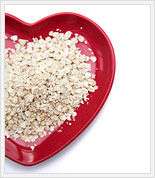|
|
Lowering Cholesterol Through Diet & Exercise
QUESTION:
I have high cholesterol and would like to avoid taking medication. How can I improve my cholesterol levels naturally through diet and exercise?
ANSWER:
 It is wonderful that you'd like to implement exercise and good nutrition into your life prior to seeking out the pharmaceutical route of lipid lowering medication. Regular exercise and dietary modification can greatly improve your cholesterol profile and prevent the development of heart disease. It is wonderful that you'd like to implement exercise and good nutrition into your life prior to seeking out the pharmaceutical route of lipid lowering medication. Regular exercise and dietary modification can greatly improve your cholesterol profile and prevent the development of heart disease.
When we talk about improving cholesterol profile, we specifically mean increasing HDL cholesterol (the good cholesterol) and decreasing LDL cholesterol (the bad cholesterol). Research has shown that for every 1 percent reduction in LDL cholesterol, there is a 1 percent reduction in the relative risk for developing coronary heart disease (CHD). In addition, studies have shown over and over again that total cholesterol levels can predict future occurrences of CHD.
DIETARY
I have specifically highlighted dietary changes that have been shown to positively influence lipid profiles. Be aware that the type of fat consumed is very important, more so even than the total amount of fat. Therefore, choose your fats carefully by following the guidelines below.
- Limit saturated fats to less than 7 percent of total calories. Animal fat, coconut oil, palm and palm kernel oil are high in saturated fat.
- Limit trans fatty acids to less than 1 percent of total calories as they also have been linked with an increase in heart disease risk. Trans fatty acids are primarily found in processed foods containing partially hydrogenated vegetable oils, some margarines and shortenings, and commercially prepared fried foods.
- Allow up to 10% of total calories from polyunsaturated fatty acids (PUFA's). Make sure to include omega-3 fatty acids (a specific type of PUFA) in your diet by consuming flaxseeds, a variety of oily fish, walnuts, or canola, soybean and flaxseed oils.
- Limit cholesterol to less than 200 mg per day.
- Allow up to 20 percent of total calories from monounsaturated fats (MUFA's). Such an intake of MUFA's will actually help maintain and possibly increase your HDL cholesterol levels, whereas overall low-fat diets have been shown to decrease HDL cholesterol as well as LDL cholesterol. Olive oil, canola oil, olives, nuts, seeds, and avocados are good sources.
- Dietary fiber has also been shown to lower LDL cholesterol levels. Women should aim for at least 25 grams of fiber daily; men should strive for a minimum of 38 grams. Good sources are fruits and vegetables, barley, beans and other legumes, whole- and high-fiber grain products, oatmeal, oat bran and psyllium husk.
- Including 25 - 50 grams of soy protein in your daily diet can reduce cholesterol by up to 5%. Good sources are soymilk, soy flour, tofu, tempeh, and meat replacements containing soy protein. Using soy foods to replace meat in some meals is a great way to lower saturated fat intake while increasing soy protein intake.
EXERCISE
Physical activity is a proven and effective way to improve your lipid profile.
- Engage in 30 - 60 minutes of moderate to vigorous intensity activity on at least five days of the week, preferably every day. This amount of activity will increase HDL cholesterol levels and lower LDL cholesterol levels.
Make sure you discuss your approach with your health care provider and obtain guidance in the appropriate exercise intensity for you individually. In addition, working one-on-one with a registered dietitian or licensed nutritionist can greatly enhance your ability to make these dietary changes. If you are at high risk for coronary heart disease, your doctor may recommend a more aggressive approach in which you combine lifestyle changes with drug intervention to improve your profile more quickly. Good luck!

Related Articles:
|
 |
 |
Our expert, Dr. Sharon E. Griffin, holds a B.S., M.S., and Ph.D. in the areas of exercise science/physiology. She also holds a second M.S. degree in Nutrition and is a licensed nutritionist and an ACSM certified health and fitness instructor.
|

